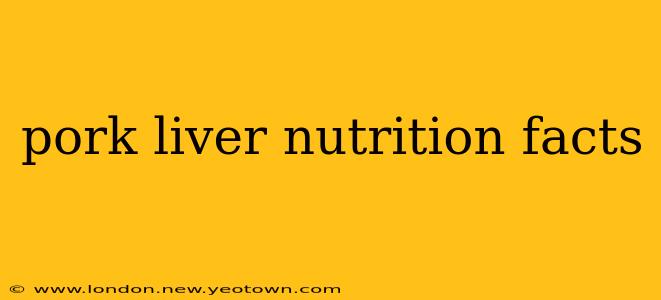Pork liver, often overlooked in modern diets, is a nutritional powerhouse packed with essential vitamins and minerals. While its strong flavor might not appeal to everyone, understanding its remarkable nutritional profile can change your perspective. This isn't just about numbers on a label; it's about unlocking the potential of a truly nutrient-dense food. Let's delve into the fascinating world of pork liver nutrition.
What are the Nutritional Benefits of Pork Liver?
Pork liver boasts an impressive array of nutrients. It's exceptionally rich in Vitamin A, surpassing many other foods. This vitamin plays a crucial role in vision, immune function, and cell growth. Beyond Vitamin A, it's a significant source of Vitamin B12, crucial for nerve function and red blood cell formation. It also provides a healthy dose of iron, essential for carrying oxygen throughout the body and preventing anemia. Furthermore, pork liver contains various other B vitamins, copper, selenium, and zinc, all contributing to overall health and wellbeing.
Is Pork Liver High in Cholesterol?
This is a common concern, and rightfully so. Pork liver is relatively high in cholesterol. However, the impact of dietary cholesterol on blood cholesterol levels is a complex topic that's been debated extensively. While some individuals may need to limit their intake of cholesterol-rich foods, others might not experience significant negative effects. The best approach is to consult with a healthcare professional or registered dietitian to determine what's right for your individual needs and health history. They can assess your overall dietary intake and health profile to provide personalized guidance.
How Much Pork Liver Should I Eat?
Moderation is key when incorporating pork liver into your diet. Because of its high cholesterol content and the potential for consuming excessive amounts of certain vitamins, it's not meant to be a daily staple. A serving size of 3-4 ounces (around 85-113 grams) a couple of times a month is often recommended. Remember, a balanced diet is crucial, and pork liver should be considered one component of a larger, varied eating plan.
What are the Potential Risks of Eating Pork Liver?
While pork liver is packed with nutrients, it's important to be aware of potential risks. As mentioned, its high cholesterol content is a consideration. Additionally, excessive consumption can lead to vitamin A toxicity, which can have adverse health effects. It's also crucial to ensure the liver is properly sourced and prepared to minimize the risk of contamination. Always opt for fresh, high-quality liver from reputable sources and cook it thoroughly to ensure food safety.
How Can I Prepare Pork Liver?
Many people find pork liver's strong taste off-putting. However, with the right preparation techniques, it can be quite palatable. Soaking the liver in milk before cooking can help to tenderize it and reduce some of the strong flavor. Pan-frying, sautéing, or braising are popular cooking methods. Adding flavorful herbs and spices can further enhance its taste and create a delicious and nutritious meal. Recipes are readily available online and in cookbooks, offering various ways to enjoy this nutrient-rich food.
Conclusion: A Powerful Addition to a Balanced Diet
Pork liver, when consumed in moderation and as part of a well-rounded diet, can be a valuable source of essential nutrients. Its impressive vitamin and mineral profile offers significant health benefits. Remember to consult with your healthcare professional or a registered dietitian to determine the appropriate amount for your individual needs and to address any concerns related to cholesterol or other potential health factors. Ultimately, informed choices and balanced eating habits are key to achieving optimal health.

